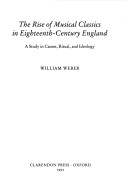Clarendon Paperbacks
1 total work
18th-century England was the first country where old musical works were performed regularly and reverentially, and where a collective notion of such works - "ancient music" - first appeared. This work explores the formation of musical "classics" in regard to repertory and social context. It examines the performance of old music of the Elizabethan period at the beginning of the century, through the performance of works by Henry Purcell, Arcangelo Corelli, and other English and Italian composers, to the development of festivals that featured choral-orchestral works of Purcell and Handel. It concludes with the establishment of the Concert of Antient Music in 1776, where the traditions of performing old works came together as a self-conscious canon focused upon the work on Handel. The book examines closely the political and social reasons for these developments. In addition, it shows how they laid the groundwork for the classical-music tradition of the 19th century.
